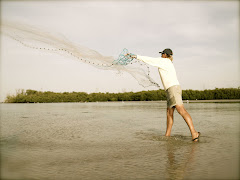For those of you Facebook users... SoulMate Charters has a site on FB and I post weekly fishing reports, photos and what's happening on the water in the southwest Florida area.
Simply click on the title of this article and stop by and take a look!
Wednesday, February 15, 2012
Fishing in February can be tough but fun

As I write this we are bouncing back from a February cold front with warm days and cool nights that are much more representative of our normal winter weather. However, it still feels much cooler to those of us that live here year round. My brother reminded me that before I took up guiding for a living we use to avoid fishing in the months of January and February. It was just too cold for man or beast to be on the water! Because of this we really never had to think much about tactics for finding fish in the winter months. We spent that time tying flies, repairing boats and fishing gear and watching football and basketball on TV.
Our time for fishing was in the spring, summer and fall looking for tarpon, snook, redfish and trout. It was easy. We caught live shiners; we put them on a hook and threw them in front of the fish. Fish on! OK… Maybe it wasn’t quite that easy but it was a whole lot better than putting on three layers of clothing and not even seeing a tarpon or snook the entire day.
But then I decided to take fishing on as a profession and because of the proliferation of winter guests during that time of year, I was forced to deal with the less than ideal weather and to learn the patterns of angling in January and February.
So here is a bit of what I’ve learned.
The best bait for winter fishing is live shrimp; period. Fish love shrimp, especially in the cold water months. It moves slow and provides an easy meal. Fish really don’t want to chase anything fast moving when the water temperature drops below 65 degrees. Their metabolism has slowed down so they are in no way as aggressive as they are in warmer water.
The two best fish to hunt for in January and February are sheepshead and spotted sea trout. Both not only do well in the colder water, they seem to enjoy it. Sheepshead can be found around dock pilings and oyster beds as well as in deep pockets under mangrove overhangs. While I’ve heard a bunch of suggestions on how to catch them, I keep it pretty simple. I like small 1/8 oz. purple jig heads with 1/0 hooks. I then place half of a live shrimp on the hook and then cast to the target. The trickiest part is the hook set. You’ve got to almost anticipate the bite to be successful. They are the best bait stealers in the business! My youngest daughter’s advice is this. “When you feel a sheepshead tap the bait, count to 3 and go on 2.”
Trout fishing in the winter is a bit different than going after them in the summer months. They move from the shallow water flats to deeper areas often very near to where you would normally find them in the warmer months. I suggest starting in depths a little better than 4 feet. The best areas seem to be where you have some grass beds mixed in with small sandy potholes. For example, check out the flat just to the north of the power lines in Pine Island Sound. My favorite way to fish for them is similar to going after the sheepshead. I use a 1/4 oz. yellow jig head with a 1/0 or 2/0 hook. I take the tail off of the live shrimp and then thread the hook through the opening where the tail use to be. You can run the hook up through the body or down toward the legs. I’ve found it really doesn’t matter all that much. Make a cast and use a very slow jigging action while retrieving the bait. You need to get down near the bottom but not so close that you are picking up grass on the retrieve. The winter trout bite is not much more than a dull bump so if you feel anything at all, set the hook. Oh yeah, I use the yellow jig because you never know when you are going to come upon a pompano while trout fishing. It seems their favorite color is yellow.
While these 2 species are what I’d target on the coldest days, they are by no means the only fish out there. The water temperatures are going to move up and down quite a bit during February and this will bring the opportunity for catches of spanish mackerel, bluefish, pompano, ladyfish and a lot of small sharks. All kidding aside, it really is a great time to wet a line and it beats sitting inside watching fishing shows on television!
Subscribe to:
Comments (Atom)


